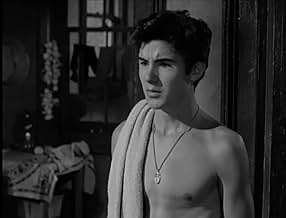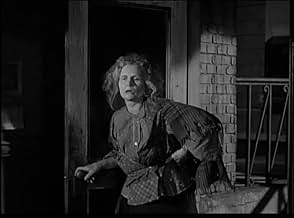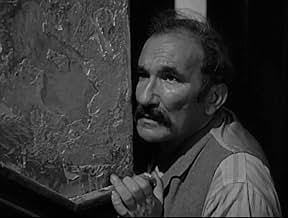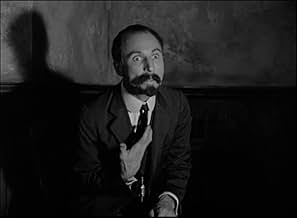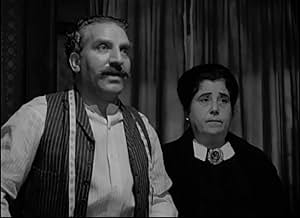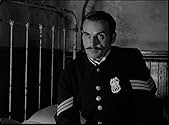IMDb-BEWERTUNG
6,4/10
1024
IHRE BEWERTUNG
Füge eine Handlung in deiner Sprache hinzuBack in NYC from Italy, Johnny Columbo seeks revenge on his father's killers, the Black Hand. Love and friendship with a police officer make him consider lawful alternatives to vengeance.Back in NYC from Italy, Johnny Columbo seeks revenge on his father's killers, the Black Hand. Love and friendship with a police officer make him consider lawful alternatives to vengeance.Back in NYC from Italy, Johnny Columbo seeks revenge on his father's killers, the Black Hand. Love and friendship with a police officer make him consider lawful alternatives to vengeance.
- Regie
- Drehbuch
- Hauptbesetzung
Eleonora von Mendelssohn
- Maria Columbo
- (as Eleonora Mendelssohn)
Empfohlene Bewertungen
Black Hand (1950)
Sandwiched between his many superb musicals, this straight up drama has Gene Kelly playing an Italian returning home to find out who murdered his father years before. It's very well made—crisp writing and editing, excellent acting, and a kind of mise-en-scene that seems about right for bustling New York.
The pressure Italian mobsters press onto their own neighborhood Italian store owners and merchants is terrible and maddening, of course, and here we are made to feel it as directly as a movie can manage. Besides Kelly, two other actors are just superlative—J. Carol Naish, playing the police detective who eventually goes to Italy to find evidence, and the store owner (whose name I can't find in a hurry). Oddly, both Naish and Kelly are Irish-Americans playing Italians in early 20th Century New York.
The plot is a bit forced, as this kind of large social-issue movie usually ends up doing. The mob (known as the Black Hand) is making life miserable for average folk, and whenever one resists, they end up dying or almost. But somebody has to do something about this, so between the cops (some Italian, some not) and the heroics of one individual (played by Kelly), the thugs are brought down one little notch.
But if you go along with inevitable victory of the little guy over the forces of evil, you'll see a really finely made drama with terrific acting (Kelly is no slouch and Naish is brilliant) and excellent filming (almost inevitable in lat 1940s American cinema). There are lots of other characters, a few chilling scenes, some dreamy idealism, and in all a look at the times with only a slight filter over the harsher reality that is, always, the truth.
Sandwiched between his many superb musicals, this straight up drama has Gene Kelly playing an Italian returning home to find out who murdered his father years before. It's very well made—crisp writing and editing, excellent acting, and a kind of mise-en-scene that seems about right for bustling New York.
The pressure Italian mobsters press onto their own neighborhood Italian store owners and merchants is terrible and maddening, of course, and here we are made to feel it as directly as a movie can manage. Besides Kelly, two other actors are just superlative—J. Carol Naish, playing the police detective who eventually goes to Italy to find evidence, and the store owner (whose name I can't find in a hurry). Oddly, both Naish and Kelly are Irish-Americans playing Italians in early 20th Century New York.
The plot is a bit forced, as this kind of large social-issue movie usually ends up doing. The mob (known as the Black Hand) is making life miserable for average folk, and whenever one resists, they end up dying or almost. But somebody has to do something about this, so between the cops (some Italian, some not) and the heroics of one individual (played by Kelly), the thugs are brought down one little notch.
But if you go along with inevitable victory of the little guy over the forces of evil, you'll see a really finely made drama with terrific acting (Kelly is no slouch and Naish is brilliant) and excellent filming (almost inevitable in lat 1940s American cinema). There are lots of other characters, a few chilling scenes, some dreamy idealism, and in all a look at the times with only a slight filter over the harsher reality that is, always, the truth.
Although basically an Irishman with Irish parents, Gene Kelly succeeds very well in making a convincing Italian character. It is a great story in which Kelly gets plenty of opportunities to excel in his acrobatics (bur no dancing here!) as he generally insisted on doing his own stunts. Little Italy in New York, in which more Italians lived than in Rome around 1900, is very well recreated with excellent cinematography and photography and comes alive, in all its primitive conditions and circumstances but with the mob no less vicious and insidious than in later Godfather days; and the thriller created is as good a match as any to later New York gangster films. Teresa Celli is even more convincing as the Italian lady of the film, and all other characters are also absolutely right, especially J. Carrol Laish as the intrepid policeman ending up a martyr for not being too careful. The music by Alberto Colombo is also perfect, but I think the prize goes to Paul Vogel for the almost expressive photography.
It doesn't make a good impression. It's in black and white, involves Gene Kelly in a strictly dramatic role, has low production values, and is rarely shown and never publicized. All the trappings of a B feature when movie theaters still showed double bills.
Yet it's interesting, for three main reasons. One is that the story itself simply isn't too bad. Unlike many of the Godfather-type epics, Italian immigrant life isn't romanticized. The settings are grungy. Families don't live in secluded splendor. If the plot isn't nearly as nuanced as more modern stories on the subject, neither does it falsify the nature of criminal groups. There are clearly good guys here, and clearly bad guys, and a couple of guys squeezed in the middle.
Two questions are raised that have little to do with the Black Hand. Few of the principal actors are Italian. Does it matter? Kelly, curly haired and wearing dark make up, looks the part, although he sounds like a Mid-Westerner rather than an Italian immigrant to New York. (He pronounces his Italian correctly, though.) J. Carrol Naish, an Irishman from New York, is also made to look swarthy and gives what is for him a modulated performance. The man specialized in ethnic universality. He played Arabs, Asiatic Indians, lots of Italians, and God know what else, except an Irishman. Like Lawrence Olivier, he had only one accent that seemed to fit all of his parts. Some years ago, Vanessa Redgrave, a virulent pro-Palestinian, played a Jewish violinist in a pretty decent TV movie -- "Playing for Time," I think was the title -- about survival in Theresenstadt. Whew! What a brouhaha! Imagine an anti-Zionist playing a Jew in a concentration camp! Before that, Freddie Prinz came in for a blistering because he played a Mexicano in "Chico and the Man," a TV series, and Prinz was half Hungarian and half Puerto Rican. Again, it seems to matter, but should it? Doesn't the essence of acting involve playing the part of someone else? Unless the portrayal is so far off the mark that it works only as parody, why should it matter to us? Reduced to the absurd, the argument would have us never playing anyone other than ourselves. The same logic would have us object to every performance on screen or stage, because the actors are pretending to be something that -- genetically and culturally -- they are not.
The second question, and the third thing about the movie that I found impressive, had to do with the sets. The production is studio bound. Large scale location shooting was only beginning in 1949. The sets are clearly artificial. But, although not as convincing as on-location shooting, the production is at least as suggestive, seeming a bit stylized and stylized in the right direction. Turn-of-the-century New York City poverty has rarely been so well captured. The head of the local Black Hand is arrested while taking a bath. He is in his cellar. (It's a definite "cellar," not a "basement"!) There is a single naked overhead light. The cellar walls seem made of large bricks hastily thrown together. The man is naked in a bathtub that has no running water. (He undoubtedly filled it with water from kettles warmed on the top of a coal burning range in the upstairs kitchen.) A goat stands placidly next to the tub, ignoring the intrusion of the cops. Now THAT is production design. Studio sets can be taken even further and still be effective. A scene in "Mystery of the Wax Museum" or "Horrors of same" has Phyllis Kirk being chased through turn-of-the-century New York streets by a deformed and murderous madman. The streets through which she runs and he shuffles bear the same resemblance to real streets that a schematic diagram does to the inside of a TV set. The apartment fronts look made of thin plywood. The windows -- all equally lighted with bland yellow -- are of identical size and all have their shades drawn, like glowing but blank and impenetrable eyes, suggesting there is no succor for the heroine behind any of them, only thin buttresses propping up the false fronts and a couple of lights strung by the grip. And of course, there are no pedestrians, there is no garbage in the gutters or the streets, let alone garbage cans, no vehicles, no nothing except those surrealistically empty streets. "The Black Hand" doesn't go this far, but is an effective suspension of realism and stylization. The scenes in "Naples" are almost overboard. The night-time streets of Italy are well enough done but Naish eats in a Neapolitan restaurant with a view overlooking a patently false bay. It's the kind of "staged authenticity" that the sociologist Dean MacCannell described. All that was needed, besides that blow up, would be a couple of fish nets and phony salamis and provolones hanging from the walls.
There are three kinds of phoniness here: (1) the plot that pits good against evil; (2) the substitution of non-Italian actors for Italian characters; and (3) the use of studio sound stages as substitutes for real locations. None of it matters. It's not a bad flick. Not very good -- no one could argue that -- but simply not bad. I enjoyed it anyway. I mean, in a way, its phoniness is emblematic of our own realities. Are you really everything you claim to be?
Yet it's interesting, for three main reasons. One is that the story itself simply isn't too bad. Unlike many of the Godfather-type epics, Italian immigrant life isn't romanticized. The settings are grungy. Families don't live in secluded splendor. If the plot isn't nearly as nuanced as more modern stories on the subject, neither does it falsify the nature of criminal groups. There are clearly good guys here, and clearly bad guys, and a couple of guys squeezed in the middle.
Two questions are raised that have little to do with the Black Hand. Few of the principal actors are Italian. Does it matter? Kelly, curly haired and wearing dark make up, looks the part, although he sounds like a Mid-Westerner rather than an Italian immigrant to New York. (He pronounces his Italian correctly, though.) J. Carrol Naish, an Irishman from New York, is also made to look swarthy and gives what is for him a modulated performance. The man specialized in ethnic universality. He played Arabs, Asiatic Indians, lots of Italians, and God know what else, except an Irishman. Like Lawrence Olivier, he had only one accent that seemed to fit all of his parts. Some years ago, Vanessa Redgrave, a virulent pro-Palestinian, played a Jewish violinist in a pretty decent TV movie -- "Playing for Time," I think was the title -- about survival in Theresenstadt. Whew! What a brouhaha! Imagine an anti-Zionist playing a Jew in a concentration camp! Before that, Freddie Prinz came in for a blistering because he played a Mexicano in "Chico and the Man," a TV series, and Prinz was half Hungarian and half Puerto Rican. Again, it seems to matter, but should it? Doesn't the essence of acting involve playing the part of someone else? Unless the portrayal is so far off the mark that it works only as parody, why should it matter to us? Reduced to the absurd, the argument would have us never playing anyone other than ourselves. The same logic would have us object to every performance on screen or stage, because the actors are pretending to be something that -- genetically and culturally -- they are not.
The second question, and the third thing about the movie that I found impressive, had to do with the sets. The production is studio bound. Large scale location shooting was only beginning in 1949. The sets are clearly artificial. But, although not as convincing as on-location shooting, the production is at least as suggestive, seeming a bit stylized and stylized in the right direction. Turn-of-the-century New York City poverty has rarely been so well captured. The head of the local Black Hand is arrested while taking a bath. He is in his cellar. (It's a definite "cellar," not a "basement"!) There is a single naked overhead light. The cellar walls seem made of large bricks hastily thrown together. The man is naked in a bathtub that has no running water. (He undoubtedly filled it with water from kettles warmed on the top of a coal burning range in the upstairs kitchen.) A goat stands placidly next to the tub, ignoring the intrusion of the cops. Now THAT is production design. Studio sets can be taken even further and still be effective. A scene in "Mystery of the Wax Museum" or "Horrors of same" has Phyllis Kirk being chased through turn-of-the-century New York streets by a deformed and murderous madman. The streets through which she runs and he shuffles bear the same resemblance to real streets that a schematic diagram does to the inside of a TV set. The apartment fronts look made of thin plywood. The windows -- all equally lighted with bland yellow -- are of identical size and all have their shades drawn, like glowing but blank and impenetrable eyes, suggesting there is no succor for the heroine behind any of them, only thin buttresses propping up the false fronts and a couple of lights strung by the grip. And of course, there are no pedestrians, there is no garbage in the gutters or the streets, let alone garbage cans, no vehicles, no nothing except those surrealistically empty streets. "The Black Hand" doesn't go this far, but is an effective suspension of realism and stylization. The scenes in "Naples" are almost overboard. The night-time streets of Italy are well enough done but Naish eats in a Neapolitan restaurant with a view overlooking a patently false bay. It's the kind of "staged authenticity" that the sociologist Dean MacCannell described. All that was needed, besides that blow up, would be a couple of fish nets and phony salamis and provolones hanging from the walls.
There are three kinds of phoniness here: (1) the plot that pits good against evil; (2) the substitution of non-Italian actors for Italian characters; and (3) the use of studio sound stages as substitutes for real locations. None of it matters. It's not a bad flick. Not very good -- no one could argue that -- but simply not bad. I enjoyed it anyway. I mean, in a way, its phoniness is emblematic of our own realities. Are you really everything you claim to be?
I like this movie because it takes us back in time and we get to see how the start-up was for people who came to America and why. Everyone in this movie works hard, dreams, sacrifices and wants the best for their children, themselves and their neighbors, family and friends. However, the wolves move-in and instead of everyone enjoying the fruits of their labor, they now shift from living care free into a predator prey environment. The one trying to make a go is vulnerable and the ones trying to make a quick, dishonest buck go to work ala the black hand! Pay attention to the dress, streets, shops, sights and sounds and how there was so much opportunity if one wanted to work. Note how many people share a room and how rooms where above the stores back then. In the movie, one guy points out to another that speaking English and Italian is all the edge you need to make it rich in this country at that time. There is another similar film with Ernest Borgnine call Pay or Die that covers the same subject matter and is entertaining as well. Good movie to eat and have a tasty drink plus a snack. Gene Kelly who speaks a decent Italian in the film at least and J. Carol Naish too. Enjoy this Buono Cinema
With its scenes of extortion and murder in the Italian-American community of Manhattan's Lower East Side at the turn of the century, The Black Hand inevitably calls to mind the flashbacks to young Vito Corleone's start in The Godfather, Part II. And while it's far from that league, there's much in The Black Hand to admire.
Eight years after the murder of his father, an Italian immigrant, for daring to oppose the criminal organization called The Black Hand (the script also calls it The Mafia and The Comorra), young Gene Kelly returns to New York to pursue his vendetta. With the help of police detective J. Carrol Naish, he tries to organize the tenement neighborhood to resist the reign of intimidation and terror. But the mob has moles who anticipate and thwart his every move. When Naish travels to Naples on the case, he's killed, but not before mailing an envelope of incriminating photos to Kelly. But the little brother of Kelly's girlfriend (Teresa Celli) is kidnapped, with the envelope serving as ransom....
Among the movie's admirable points are the thoughtful, rather restrained script and foreboding nightscapes, both in New York and Naples, which lend the film a noirish tinge (as do a couple of adroitly staged moments of suspense). But the story occasionally rambles off into rhetoric about the exploitation of the immigrant underclass by politicians and police valid points, but not presented dramatically. Another dramaturgical shortcoming is that the many characters haven't been sufficiently individuated, leaving a generic ethnic muddle. The romantic angle is oddly subdued, too. The Black Hand shows signs of an interesting and ambitious production that nonetheless falls somewhat short of what it might have been.
Eight years after the murder of his father, an Italian immigrant, for daring to oppose the criminal organization called The Black Hand (the script also calls it The Mafia and The Comorra), young Gene Kelly returns to New York to pursue his vendetta. With the help of police detective J. Carrol Naish, he tries to organize the tenement neighborhood to resist the reign of intimidation and terror. But the mob has moles who anticipate and thwart his every move. When Naish travels to Naples on the case, he's killed, but not before mailing an envelope of incriminating photos to Kelly. But the little brother of Kelly's girlfriend (Teresa Celli) is kidnapped, with the envelope serving as ransom....
Among the movie's admirable points are the thoughtful, rather restrained script and foreboding nightscapes, both in New York and Naples, which lend the film a noirish tinge (as do a couple of adroitly staged moments of suspense). But the story occasionally rambles off into rhetoric about the exploitation of the immigrant underclass by politicians and police valid points, but not presented dramatically. Another dramaturgical shortcoming is that the many characters haven't been sufficiently individuated, leaving a generic ethnic muddle. The romantic angle is oddly subdued, too. The Black Hand shows signs of an interesting and ambitious production that nonetheless falls somewhat short of what it might have been.
Wusstest du schon
- WissenswertesThis was originally set up as a Robert Taylor vehicle.
- Alternative Versionenoriginal story about Lt. Petrosino,real NYC police officer, remade as Pay or Die with Ernest Borgnine
Top-Auswahl
Melde dich zum Bewerten an und greife auf die Watchlist für personalisierte Empfehlungen zu.
- How long is Black Hand?Powered by Alexa
Details
- Erscheinungsdatum
- Herkunftsland
- Sprachen
- Auch bekannt als
- La Mano Negra
- Drehorte
- Produktionsfirma
- Weitere beteiligte Unternehmen bei IMDbPro anzeigen
- Laufzeit
- 1 Std. 32 Min.(92 min)
- Farbe
- Seitenverhältnis
- 1.37 : 1
Zu dieser Seite beitragen
Bearbeitung vorschlagen oder fehlenden Inhalt hinzufügen

